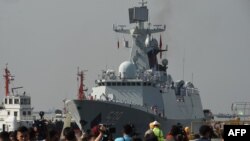Philippines leaders are moving to purchase sophisticated anti-ship cruise missiles in what analysts see as a sign of new resolve to stand up to China in a maritime dispute and to pivot further toward Manila's traditional ally, the United States.
The Philippines made deals in January to acquire BrahMos missiles from a Russian-Indian joint venture. The move follows Manila's July 2021 consent to sustain a U.S. visiting forces agreement, which allows for arms sales, intelligence sharing and U.S. troops' access to Philippine soil for military exercises.
The Philippines is a part of a network of pro-U.S. countries in East Asia, but President Rodrigo Duterte challenged the U.S. alliance in 2016 by pursuing friendly ties with Asian superpower China, which he lauded while criticizing U.S. influence in his country. A series of territorial disputes in the South China Sea have cooled Duterte's overtures over the past four years.
"He doesn't like slights to his authority, slights to his ego and slights to Philippine sovereignty, and he's faced that," said Carl Thayer, emeritus professor of politics at the University of New South Wales in Australia. "And so, I think his legacy in his mind — 'we stood up to the United States in the beginning and then it didn't work with China' — and so he's punishing them."
Missile orders
BrahMos Aerospace Private Ltd. announced the signing of its contract with the Philippine Department of National Defense in a terse January 28 press release on its website.
Manila's state-run Philippine News Agency reported a week previously that the deal was worth $375 million and that two batteries would be available to the Philippine army for coastal defense missions.
Experts say the Philippines' armed forces, which set out eight years ago to modernize at sea, would likely use the missiles to deter Beijing's use of coast guard, naval and fishing vessels in the South China Sea west of Luzon Island and south of Hong Kong, experts say.
"In a conflict situation, they would be used to attack vessels at sea, and in the context of the Philippines, it would be more useful in controlling the movement of ships into or out of the South China Sea," said Jay Batongbacal, international maritime affairs professor at the University of the Philippines in Quezon City.
BrahMos missiles have a 290-kilometer range and are designed to travel about three and a half times faster than the American subsonic Harpoon cruise missile. The Philippines is the first non-Indian buyer of the missile systems, Stockholm International Peace Research Institute data indicate.
Old dispute, new chill
Chinese officials point to documents dating back to dynastic times as support for their claim to about 90% of the 3.5 million-square-kilometer South China Sea, while the Philippines rejects China's claim by citing a United Nations Convention on Law of the Sea. Brunei, Malaysia, Taiwan and Vietnam claim all or parts of the sea, which is valued for fisheries, fossil fuel reserves and marine shipping lanes.
Over the past decade, China, as keeper of Asia's strongest military, has alarmed the other claimants by constructing artificial islands for military use and passing its vessels through disputed tracts of water. The Philippines won a world court arbitration case against China in 2016 over the reach of China's maritime claims, but China rejected the ruling.
Duterte sought a first-ever Sino-Philippine friendship that same year, as China pledged $24 billion in aid and investment for the impoverished Southeast Asian country. Over the past four years, however, China has allowed its boats to venture near disputed maritime features, and a Chinese vessel sank a Filipino boat in 2019.
Many Filipinos believe the post-2016 uptick in Sino-Philippine relations has not delivered enough aid or investment. The U.S. government represents a more stable ally, some analysts say.
"I do think (Duterte) still recognizes that, practically speaking, the Philippines can't do it alone," said Derek Grossman, senior defense analyst with the U.S.-based Rand Corporation research organization.
Washington still "stands by its ally the Philippines," the U.S. Department of State said in a November statement on Chinese coast guard vessels that used water cannons against Filipino resupply ships in the South China Sea.
Election uncertainty
Duterte must step down from office in June because of term limits. Presidential election front-runner Ferdinand "Bongbong" Marcos Jr., son of the late dictator Ferdinand Marcos, has said he would not seek U.S. help in settling the maritime dispute with China. But most Filipinos still prefer stronger U.S. ties, analysts say, so Marcos might take a tougher line against Beijing, or a stronger stance in favor of Washington, if elected in May.
"If things are stable in the South China Sea, then China won't be much of an election issue, but, for example, (if) another incident takes place, this will prop up nationalist sentiment here in the Philippines," said Aaron Rabena, a research fellow at the Asia-Pacific Pathways to Progress Foundation in Metro Manila.
China has not formally protested the BrahMos missile deals. Its forces could ultimately "overwhelm" the missiles, Batongbacal said.
At a media Christmas party in December, the Chinese ambassador to Manila, Huang Xilian, sounded an optimistic note regarding overall relations. "As the relationship between China and the Philippines become increasingly closer, some differences have inevitably appeared, but this does not affect our overall relationship," Huang said.





